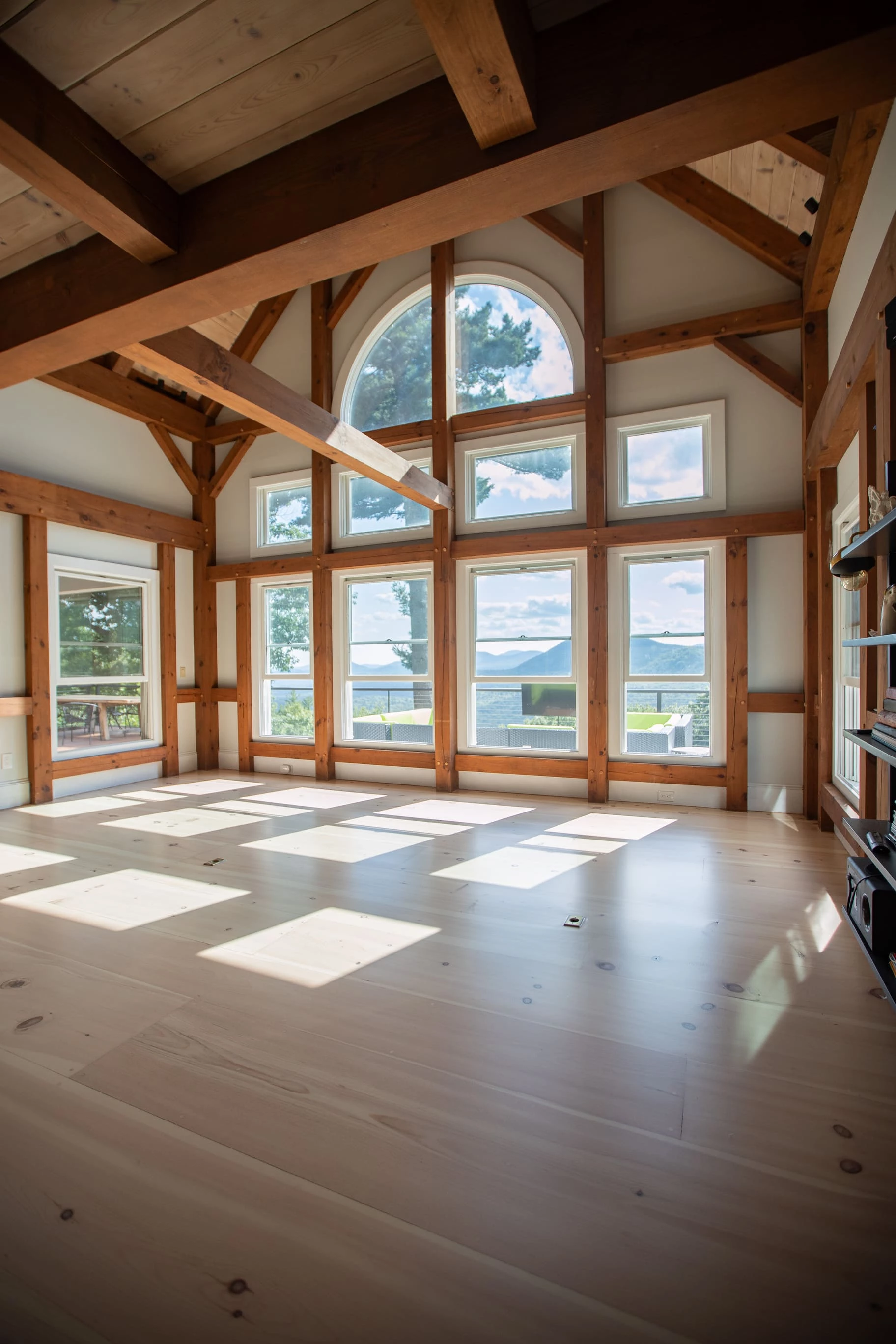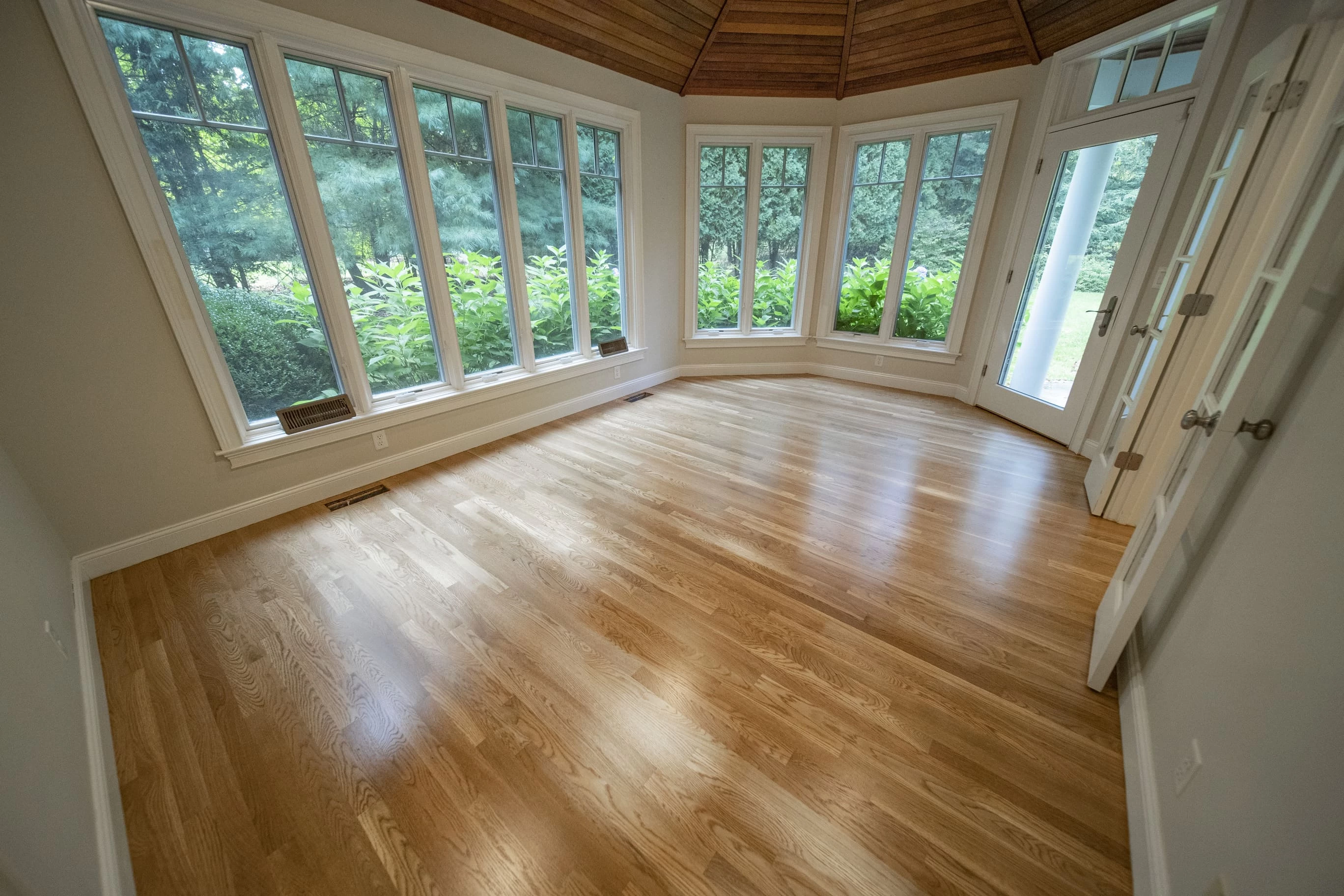- Solid vs Engineered Hardwood: Understanding the Core Differences
- Sound Performance
- Installation Methods
- Style Options
- Available Dimensions
- Similarities Between Solid and Engineered Wood Flooring
- Solid or Engineered Hardwood: Which Option Wins?
- Practical Recommendations
- When to Choose Solid Hardwood
- When to Choose Engineered Hardwood
- Finding Floor Installation Experts in Boston
Considering engineered vs solid hardwood floor for your space? Both types of hardwood flooring will enhance your interior and can fit you depending on your requirements and expectations. Engineered and solid hardwood differ in how they're made, how long they last, how you install them, and other ways. To help you make the right choice for your home, Floors Are Us compiled a comprehensive guide on solid vs engineered hardwood, exploring similarities and key differences between the two, comparing costs, analyzing installation methods, and providing expert recommendations on hardwood flooring.
Solid vs Engineered Hardwood: Understanding the Core Differences
The best decisions are grounded in facts, so let’s first check solid hardwood vs engineered hardwood features. We’ll consider composition, moisture resistance, refinishing, installation methods, longevity, and costs.
Feature | Solid hardwood flooring | Engineered hardwood flooring |
Composition | Is made of a solid piece of natural wood | A multi-layer hardwood—real hardwood on top with underneath plywood/HDF layers |
Moisture resistance | Likely to swell in humid conditions | Resistant to moisture and varying temperature |
Refinishing | Can be refinished multiple times (4-6 over its lifetime) | Refinishing times are limited to 1-2 times, depending on the thickness of the top layer |
Installation methods | Nail/staple; doesn’t fit basement spaces | Float/glue/nail; suitable for any building floor |
Expected lifespan | 30-100 years (with diligent maintenance) | 20-50 years (depending on material quality) |
Costs | Higher cost | More budget friendly |
After comparing the features of solid hardwood flooring vs engineered hardwood, you may conclude that your choice depends on your priorities. If you’re looking for long-lasting material, solid hardwood is your flooring option. However, if you’re on the lookout for flexibility and easy installations, then engineered hardwood is for you.
Let’s also check out other features of engineered hardwood floor vs solid wood to help you make the right decision.
Sound Performance
Sound performance of your floor impacts how quiet or loud your room feels. It covers both impact noises (footsteps, furniture moving, dropped items) and airborne sounds (voices, television, music).
We've created a comparison table below featuring sound characteristics of engineered hardwood versus solid hardwood floors to guide your selection process.
Feature | Solid hardwood flooring | Engineered hardwood flooring |
Feel and sound | Dense and quiet | Produces empty sound |
Soundproofing | Absorbs more sound naturally | Needs underlayment to reduce noise |
Sound performance of engineered hardwood floor vs solid hardwood is noticeable. The higher density of solid hardwood makes it a quieter option. But if you add underlayment, engineered hardwood feels just as comfortable.
Installation Methods
Installation is another crucial consideration when choosing between engineered or solid hardwood. Solid hardwood is usually installed using the nail-down or staple methods with each board attached to a wooden subfloor directly. On the other hand, engineered hardwood offers a wide range of installation methods, including nail-down, staple, glue, and floating methods.
Installation method | Solid hardwood | Engineered hardwood |
Nail | + | + |
Staple | + | + |
Glue | + | + |
Floating | - | + |
Engineered hardwood wins here because it's easier to install and better for DIY projects. However, if you hire a flooring expert like Floors Are Us, you can rest assured your hardwood, be it solid or engineered type, will be installed according to the highest quality standards.
Style Options
The choice between engineered hardwood floor vs solid wood will also strongly depend on the interior design of your space. Though both options offer diverse styling, you’ll have to compare the key features of each before making a final choice.
Feature | Solid hardwood | Engineered hardwood |
Wood species | Maple, cherry, oak, walnut | Same + more exotic hardwood veneers |
Finishes | Finished on-site or prefinished | Mostly prefinished |
Texture | Smooth or scraped | Wide range of textures |
Depending on your style preferences, you can now decide which one is better for you—engineered or solid wood flooring.
Available Dimensions
Hardwood dimensions are technical features, including thickness, width, and length, affecting the appearance of your flooring. Wider planks will make your room feel larger while narrow planks will enhance a traditional interior. On the other hand, plank length and thickness can influence the installation method and overall flooring durability.
Feature | Solid hardwood | Engineered hardwood |
Thickness | ¾ inch | From ⅜ to ⅝ inch |
Plank width | From 2 ¼ to 5 inches | From 3 to 10+ inches |
Length | Up to 7 ft | Varying lengths |
After analyzing the engineered hardwood vs solid hardwood flooring dimensions, you might get closer to your final decision. Try to think of your style expectations as well as durability requirements. This way, you’ll be able to find your perfect choice seamlessly.
Similarities Between Solid and Engineered Wood Flooring
Engineered hardwood vs solid hardwood flooring share many similarities, especially those referring to appearance and overall performance.
Below, we outline some of the key similarities between solid and engineered hardwood:
Appearance
Solid and engineered hardwood look similar because they both are composed of real wood. This means, you can’t go wrong with either option, as each will enhance your space with the same natural warmth, grain patterns, and timeless beauty.
Styling options
Whether you prefer a traditional or modern style, you’ve got a wide range of woods to choose from with both solid and engineered hardwood.
Durability
Engineered and solid hardwood are perfectly fit for handling daily use, including regular foot traffic and furniture. Though solid hardwood is considered to be more durable, with proper maintenance, engineered floor will also provide long-lasting durability.
Cleaning and maintenance
There’s practically no difference between engineered and solid hardwood cleaning and maintenance. Both types require similar care routines, including regular sweeping/vacuuming and occasional wet mopping. You don’t need to apply wax or other special cleaners to either hardwood option.
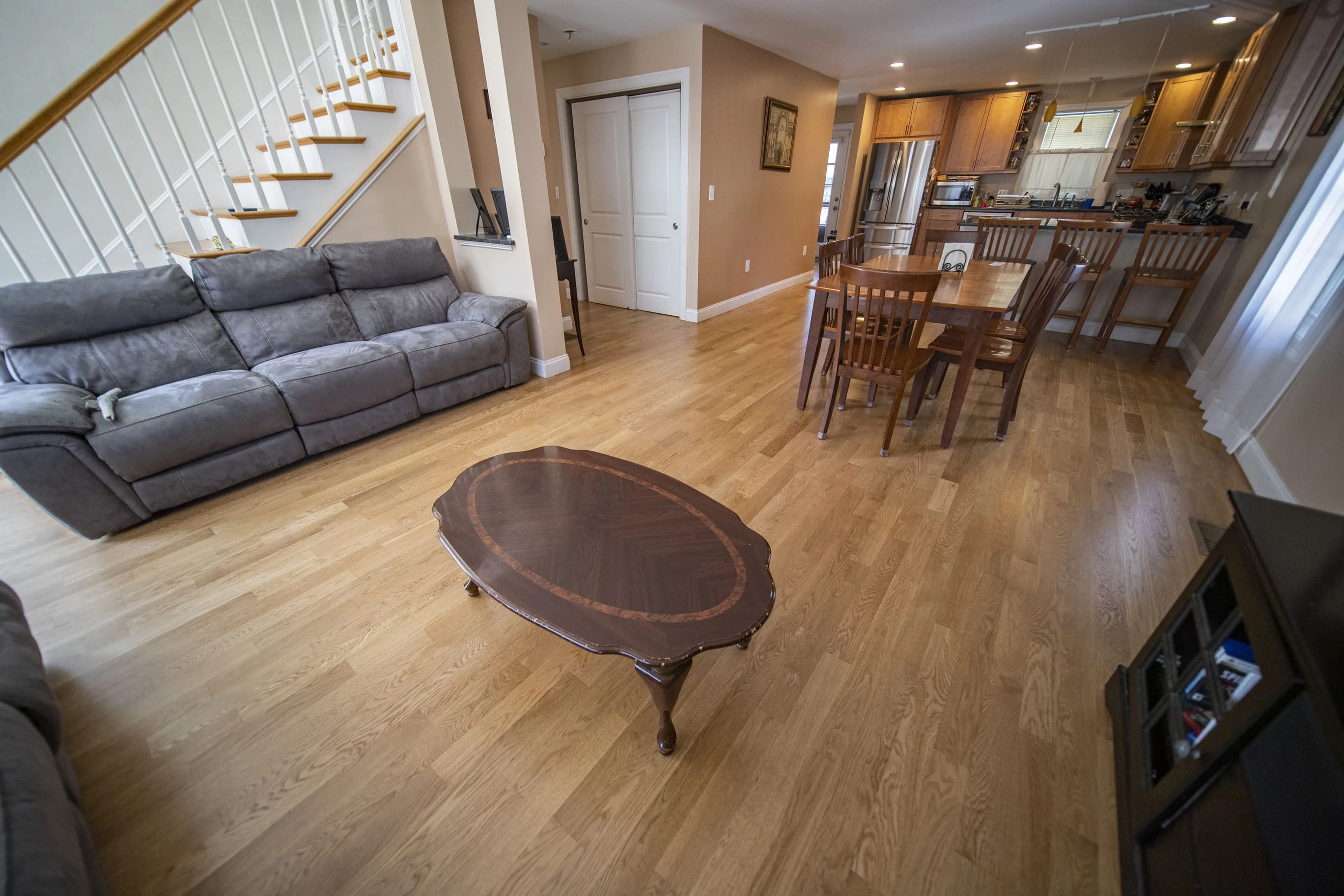
Solid or Engineered Hardwood: Which Option Wins?
There’s no universal answer when it comes to deciding between solid hardwood and engineered wood flooring. Eventually, it all comes down to your priorities. For one, engineered hardwood is better for moisture-prone areas. It also provides more flexibility with a range of installation options. Moreover, if you’re looking for a more budget-friendly option, engineered wood may be your perfect choice.
On the other hand, solid wood can be sanded multiple times, ensuring a prolonged lifespan of your flooring. Additionally, solid hardwood is considered a more durable type of flooring, offering greater resistance to wear and tear.
Thus, while deciding between solid vs engineered hardwood, follow your priorities in the first place and don’t fall for the promotion of one or another.
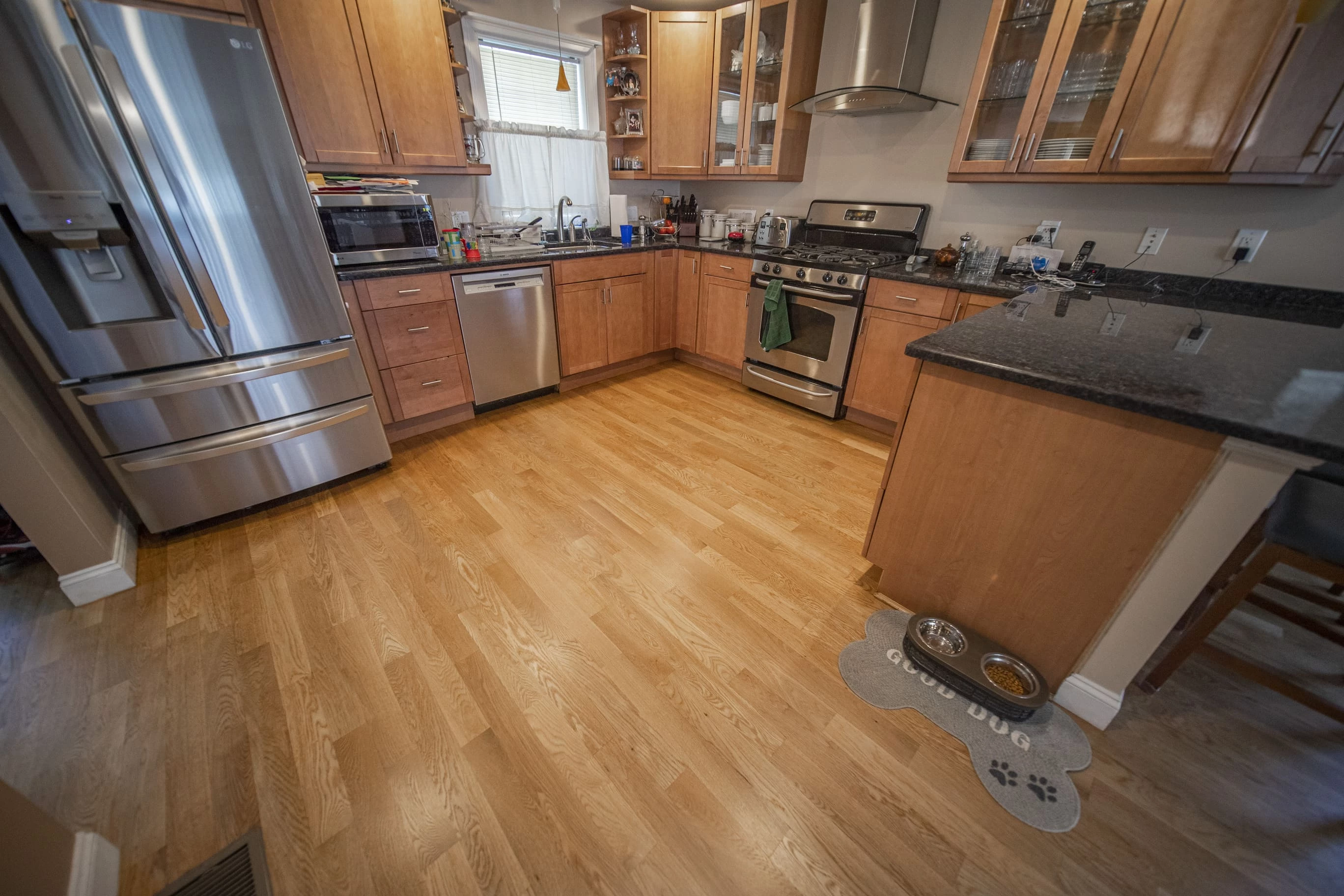
Practical Recommendations
When choosing between engineered wood flooring or solid hardwood, there’s no single answer for everyone. The final choice will depend on your priorities, like budget and current home condition. Below, we collected practical recommendations that will help you make your perfect choice.
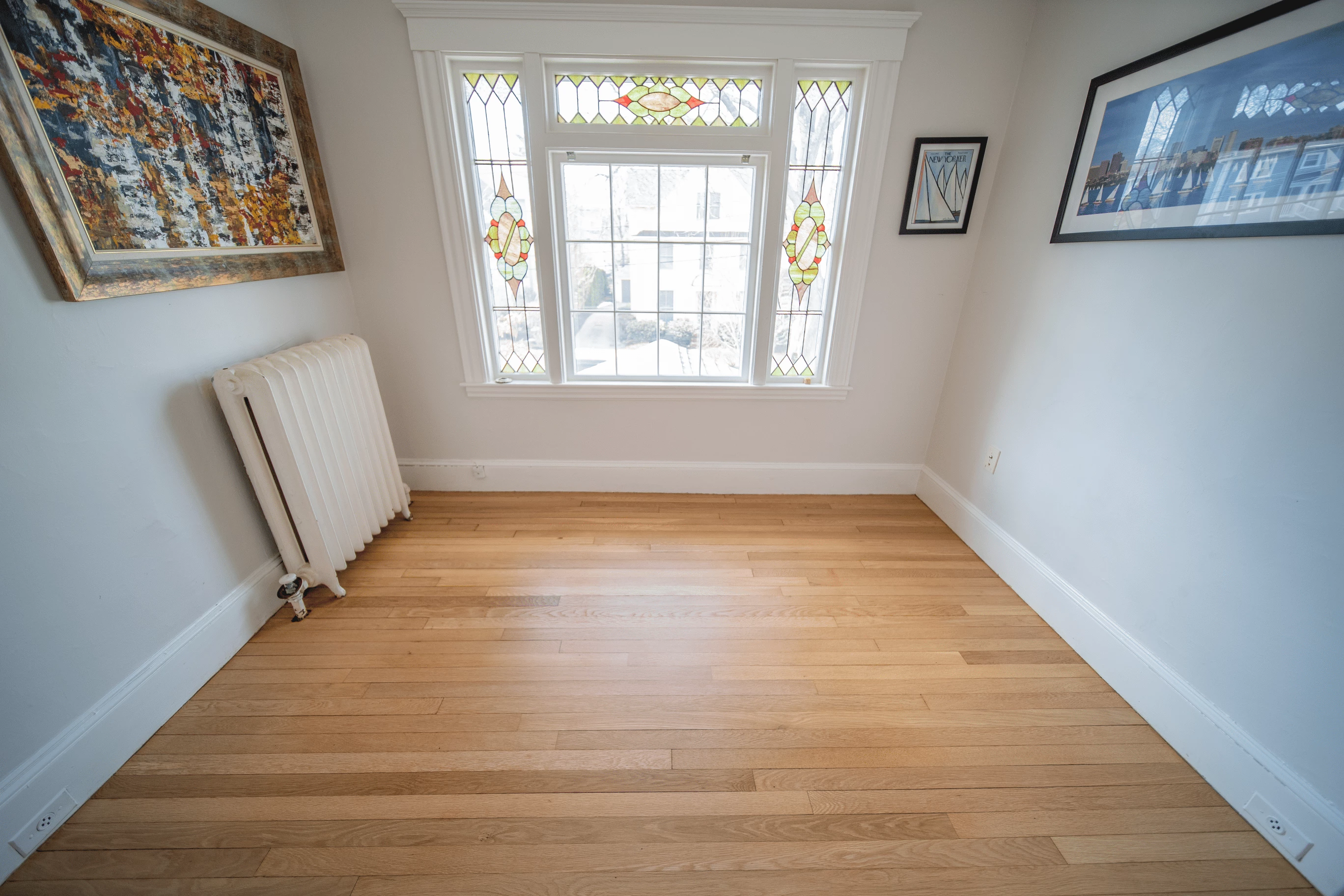
When to Choose Solid Hardwood
Solid hardwood flooring is better at long-term use. Choose solid hardwood if you’re up for a lasting investment and added resale value.
Having lower moisture resistance, solid wood is typically used for living rooms, bedrooms, and guest rooms. Thus, if you’re considering materials for any of these rooms, solid hardwood flooring may be your perfect choice.
If you’d like to have the ability to refinish your flooring multiple times, there’s no doubt solid hardwood is your option.
When to Choose Engineered Hardwood
Choose engineered hardwood if you’re looking for a budget-friendly flooring option with wide installation flexibility.
Engineered hardwood is more water-resistant than solid wood flooring. Thus, if you’re looking for material that best fits moisture-prone areas, like a kitchen, dining area, or basement, engineered hardwood fits you perfectly.
Looking to install underfloor heating? Engineered hardwood offers better stability with temperature fluctuations as well as operates as an efficient heat conductor.
Finding Floor Installation Experts in Boston
If you’re still deciding between solid and engineered hardwood, contact a flooring expert like Floors Are Us and get a comprehensive consultation.
Floors Are Us is a flooring expert in the greater Boston area specializing in hardwood flooring installation and refinishing. Our professionals always take a tailored approach to each customer to meet their expectations to the fullest.
Clients choose us for deep skills, expertise, on-time project delivery, and guaranteed quality. Whether you’re looking to install your flooring from scratch or want to remodel your existing space, Floors Are Us will fulfill any of your requests.
Contact Floors Are Us, and our experts will provide you with a free quote and a step-by-step project implementation plan.
Contact us
Ready for the best Hardwood Floors in Boston? Contact us today!
address
get in touch
Contact us today to schedule a consultation
